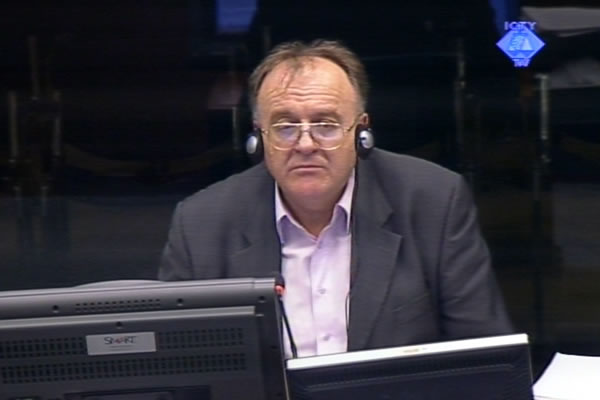Home
HADZIC'S AUTHORITIES OBSTRUCTED RETURN OF CROATS AND SERBS
Prosecution witness Veljko Dzakula says that the Krajina authorities headed by Goran Hadzic obstructed the return of Serbs to Western Slavonia as it would force them to facilitate the return of Croats to Krajina and Eastern Slavonia. That would have begged the question of the purpose of the fighting earlier on
 Veljko Dzakula, witness at the Goran Hadzic trial
Veljko Dzakula, witness at the Goran Hadzic trial The cross-examination of the president of the Serb Democratic Forum in Croatia Veljko Dzakula continued today. The witness spoke about Goran Hadzic's (un)willingness to facilitate the return of refugees in 1992 and 1993. At the time, the accused was the president of the Republika Srpska Krajina and the Vance plan was in force. The Vance plan envisaged that all persons who had been forced to leave their homes in earlier hostilities would be able to return. Hadzic is charged with the ethnic cleansing of non-Serbs from Eastern Slavonia.
Over the past few days, the witness claimed that the Krajina authorities didn't allow the Croats to return under the pretext that 'the conditions have not yet been put in place'. The defense counsel put it to Dzakula that Croats couldn't return to Eastern Slavonia before the Serbs who had been expelled from Western Slavonia were able to move out of the Croats' houses and return to their own homes. Dzakula contends that paradoxically, the RSK authorities were obstructing the return of Serbs to Western Slavonia, because they were afraid that as a result, a large number of Croats would return to Eastern Slavonia and the Knin Krajina. That would have begged the question of the purpose of the fighting earlier on in which the Croat civilians had been expelled.
The witness claims that full demilitarization of the contested areas was a prerequisite for the return of the refugees; the Vance plan called for it as well. Only Western Slavonia was demilitarized and Serbs could thus return. At one point, the return of Serb civilians to 15 villages was arranged with the UN Canadian Battalion. The Krajina authorities put a stop to the process. 'I don't claim that the Croatian side wouldn't have retaliated but at that time, the RSK prevented the return', the witness explained.
In his evidence, Dzakula said that the signing of the Daruvar Agreement in February 1993 was the most serious attempt to normalize the situation. The agreement was signed by the Western Slavonia authorities headed by Dzakula and by the Croatian representatives. The agreement called for creating the conditions for the return of Serbs but the Krajina authorities once again interfered. This time Dzakula and his associates were arrested and the return of the refugees was once again blocked. The defense counsel put it to the witness that the RSK government and President Hadzic were not pleased because the agreement was signed without their knowledge. They knew very well that the agreement would be signed but they wanted to hinder the return of the refugees, Dzakula replied.
Instead of implementing the agreement, Hadzic ordered a tank assault on Novska in retaliation for a military action launched by the Croatian Army on the Miljevci plateau, Dzakula contends. 'The lives of hundreds of children and other civilians were at stake and somebody decided to play war', the witness remarked about Hadzic's order to attack Novska. After Dzakula intervened, the attack was not launched.
The second prosecution witness thus completed his evidence at the last trial before the Tribunal, which opened recently. Dzakula said today that he had testified several times in The Hague but only once in public, at the trial of Milan Martic.
Linked Reports
- Case : Hadzic
- 2012-10-22 DZAKULA: 'SERBS' COMMITMENT TO WAR BENEFITED CROATIA'
- 2012-10-19 ‘NO CONDITIONS FOR RETURN, BUT NO EFFORT TO PUT THEM IN PLACE’
- 2012-10-18 HOW HADZIC DECIDED TO GO TO WAR WITH CROATS
- 2012-10-30 HOW HADZIC ‘COLLUDED WITH SLOBODAN MILOSEVIC
- 2012-10-31 PEACEMAKER WITH WEAPONS
- 2012-11-05 KITCHEN WITH A VIEW OF ARKAN’S TIGERS
